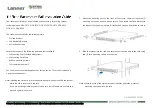
14
Setting up your wireless card
WEP
WEP is a common protocol that adds security to all Wi-Fi-compliant wireless products. WEP
gives wireless networks the equivalent level of privacy protection as a comparable wired
network.
WEP encryption keys
—After selecting either the 64-bit or 128-bit WEP encryption mode,
it is critical that you generate an encryption key. If the encryption key is not consistent
throughout the entire wireless network, your wireless networking devices will be unable to
communicate with one another. You can enter your key by typing in the hex key manually, or
you can type a passphrase into the “Passphrase” field and click “Generate” to create a key. A
hex (hexadecimal) key is a combination of numbers and letters from A–F and 0–9. For 64-bit
WEP, you need to enter 10 hex characters. For 128-bit WEP, you need to enter 26 hex
characters.
For instance:
AF 0F 4B C3 D4
= 64-bit WEP key
C3 03 0F AF 0F 4B B2 C3 D4 4B C3 D4 E7
= 128-bit WEP key
The WEP passphrase is NOT the same as a WEP key. Your card uses this passphrase to
generate your WEP keys, but different hardware manufacturers might have different
methods on generating the keys. If you have multiple vendors’ equipment in your network,
the easiest thing to do is to use the hex WEP key from your wireless router and enter it
manually into the hex WEP key table in your card’s configuration screen.
WPA
WPA is a new Wi-Fi standard that improves upon the security features of WEP. To use WPA
security, the drivers and software of your wireless equipment must be upgraded to support
it. These updates will be found on your wireless vendor’s Website. There are three types of
WPA security: WPA-PSK (no server), WPA (with radius server), and WPA2.
WPA-PSK (no server) uses what is known as a pre-shared key as the network key. A network
key is a password that is between eight and 63 characters long. It can be a combination of
letters, numbers, or characters. Each client uses the same network key to access the network.
Typically, this is the mode that will be used in a home environment.
WPA (with radius server) is a system where a radius server distributes the network key to the
clients automatically. This is typically found in a business environment.
Features
Static keys
Static keys
Dynamic key
encryption and
mutual
authentication
Dynamic key
encryption and
mutual
authentication
Encryption keys based
on RC4 algorithm
(typically 40-bit keys)
More secure than
64-bit WEP using a
key length of 104 bits
plus 24 additional bits
of system generated
data
TKIP (Temporal Key
Integrity Protocol)
added so that keys are
rotated and
encryption is
strengthened
AES (Advanced
Encryption Standard)
does not cause any
throughput loss
Summary of Contents for DX-EBDTC
Page 26: ...26 Legal notices ...
Page 85: ...Avisos legales 85 ...















































